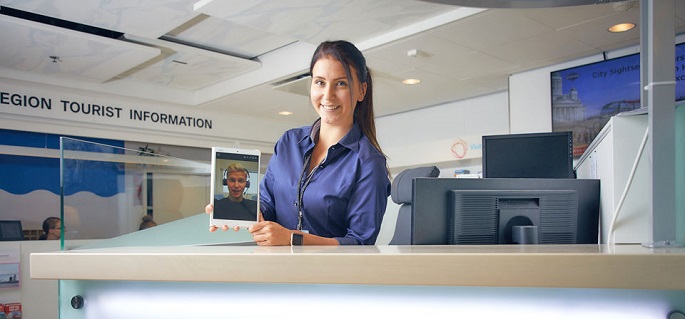Interpretation for Russians, Chinese at Helsinki airport
Published : 11 Apr 2018, 00:46
Updated : 11 Apr 2018, 00:50
It was 4 p.m. local time, and the Helsinki-Vantaa international airport was packed with Chinese passengers arriving or departing Finland. Elizaveta Vinogradova knew her rush hour of largely Chinese customers had begun.
Vinogradova is a saleswoman at a fashion shop in the non-Schengen area of the airport. She speaks English and Finnish fluently, but it was always difficult to talk with some Chinese or Russian tourists who have poorer English skills.
Since early this year, Vinogradova has been provided with a digital helper -- an application installed on a tablet or smartphone. Xinhua reporters saw her using the application when talking with a Chinese woman who wanted to know the material and origin of a handbag.
After clicking the application, Vinogradova waited for about 20 seconds before a native Chinese speaker appeared on the screen. The online interpreter translated the customer's questions from Chinese into English, and Vinogradova was able to solve the communication problem.
"It helps me a lot," Elizaveta told Xinhua about the app. She said she used the remote interpretation service every day, especially in the afternoon when she receives the most Chinese customers.
A Chinese tourist who gave her name as Chen Chen, said she had traveled to several foreign countries, and it was the first time that she got such kind of help from an international airport.
"If someone does not speak good English or has special problems, this service will be very helpful," said Chen, adding it would be nice if the service could be introduced to other places, particularly non-English-speaking countries.
The offer of such service was the latest effort by the Helsinki airport to help foreigners overcome language barriers when landing in Finland.
Provided by Helsinki-based company Tulka, the service is a remote interpretation platform based on mobile internet. When a user opens the app, one of the online interpreters respond quickly, and provide "face to face" interpretation from a foreign language to English or Finnish.
Lauri Hyry, CEO of Tulka, told Xinhua that the demand for instant interpretation increased dramatically during the refugee crisis in Europe in 2015. He organized a team and developed the platform. Since then, Tulka has been providing translation in 14 languages to refugee reception centers, police departments, hospitals, schools and other institutions.
With the increase of incoming foreign tourists, Hyry believed tourism would become a new area for Tulka's business. After a trial project, the airport decided to work with Tulka in providing the service, starting from early this year on the occasion of Chinese Spring Festival.
Tulka's Chinese interpretation is still in its early stages, said Hyry. Ten professional Chinese interpreters contracting with the company have been able to meet the demand of 15 interpretations per week.
Compared to some other languages, Hyry said, the demand for Chinese interpretation is not high at the moment, as tourism is a brand new area for Tulka. However, with the continuous increase of Chinese travelers and their awareness of the service, Hyry believes the demand for Chinese interpretation will rise.
According to Jukka Isomaki, director of commercial services at the Finnish airport operator, Finavia, the Helsinki airport chose Chinese and Russian during the testing period last year, and more languages will be added to the portfolio. "According to our surveys, incoming Chinese passengers are a very important group for us," said Isomaki.
Chinese tourists often raise questions when shopping and looking for boarding gates, going through customs, connecting flights and getting tax refunds, he added.
Statistics show that in 2017, the number of Chinese tourists visiting Finland grew by nearly 40 percent. China has emerged as the fifth largest market of incoming tourism for the 5.5 million-populated country, and the trend is still growing.
In recent years, Helsinki airport has launched a series of new measures aimed at Chinese passengers, such as displaying signs in Chinese, installing hot water dispensers, distributing red packets during the Spring Festival, and setting up Chinese-speaking guide desks.


